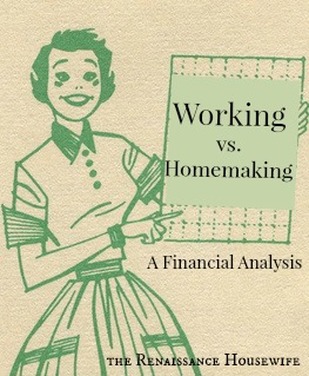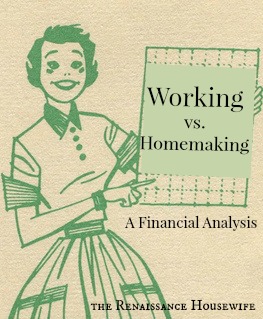The Analysis
What we need to find out is 1) how much money I actually save being at home, versus 1) how much money I make at a job, minus taxes, transportation and other work-related costs. A lot of "wages of a stay at home mom" articles skew the figures by saying you would have to pay a chauffeur, professional cook, personal stylist, etc. I'm not trying to make some political point here, I'm just trying to honestly answer a question. If I worked outside the home, we would still buy cheap food and drive a Craigslist car, so those are my "job cost figures". On the other hand, I'm a decent gardener and pretty good cook, garage sale shopper, hair cutter, etc. These skills are reflected in our savings. I would recommend that each family do their own calculations based on their own real job costs and stay-at-home savings. Perhaps you really do need a second income, but it's smart to do the math anyway.
Extra costs to having a job:
Car: $1731.96
Food: $2938.44*
Other: $1,135.31 **
Daycare***: $7200 (***for one kid)
Taxes: $4500 (30% of income)
I figure that a housewife can easily save/earn $4 per hour (working 40 hrs/week), or $5760 per year. In order to pay for job-related expenses AND earn $4/hr. for her time, a working wife without kids would have to be making at least $13,307.42 per year.
When that same working wife has a baby that needs daycare, she must increase her earnings to $22,667.42 in order to still be making $4 per hour for her time. Every additional child will force Mom to earn an extra $10,000 in order to pay for daycare and baby costs.
Working From Home?
Recently we asked our accountant if it would make sense for me to make an extra income with our farm/homestead. "Not really," she said, "because you would be taxed based on your entire household income. You would run into the same problem you have [with Hubs' business], in that 30-40% of your $5,000-$10,000 would come out to pay taxes. It wouldn't be worth your time." My extra income might put us in a higher tax bracket, thus causing Hubs' earnings to be taxed at a higher rate. And my small earnings would be taxed at Hubs' higher rate. It doesn't make sense any way you look at it.
So for us, it makes more sense for me to stay home and continue to save money doing what I love every day. At my previous job, I was making $15,000 per year- only slightly above $4 per hour. It made financial sense for me to quit, in addition to the better lifestyle I would have without the job.
The problem with going back to work (in addition to the cost of work-related expenses and higher taxes) is that your entire frugal lifestyle starts to fall apart. Nights and weekends are spent doing basic cleaning and basic meal planning. There is no time to shop for deals, no time to go to garage sales or garden or do extra money-saving cooking. There is no time to hang laundry on the line or go for bike rides in the middle of the day, let alone time for making gifts or other more advanced frugal endeavors.
In addition to the frugality aspect falling apart, I would have to be very, very diligent with my time in order to eat healthy and find time to exercise outside of work. I wouldn't be able to do things I enjoy every day, nor would I be able to spend as much time with my husband. Instead of both of us being "off work" at 6:00 pm, I would come home from work and still have laundry, cooking and cleaning to do. My work would never stop, and it would squeeze out any time for my beloved hobbies.
Is working away from home worth a few extra dollars? For me, absolutely not. Obviously if a lady is making $100,000 or something the family can hire someone to do cleaning and cooking and their lifestyle is not going to suffer. And there is always the option of a stay-at-home dad. But I think many times it would make more sense for a lady to quit her $15k-$30k job (that she doesn't like) if the husband is earning a lot more.
Back To the 1950's
When I say that the low-earner of the family should quit their job, I'm not advocating laziness or relying on welfare. I am advocating a return of good old-fashioned division of labor. The other day I read a "survival budget" put out by the local homeless coalition, which stated that a family of four is barely getting by on $50,000 per year. This is absolutely ridiculous and false... unless you are dealing with a non-frugal family who needs daycare because mom and dad both work. The paper never even addressed the possibility that maybe mom could stay home. It is getting to the point in this country where people think a stay-at-home spouse is a luxury, when in some cases it may be a financial necessity.
I've also talked to many stay-at-home moms who worked outside the home between marriage and kids. Some expressed regret that they continued to work after getting married, even though they didn't have to. Most people think that you have to have kids in order to quit your job, and that's not true. The time between marriage and kids is special because you can be supported financially, but still have no school or work obligations and therefore plenty of time to do whatever you want. This likely hasn't happened since you were four years old, and won't happen again until you are middle aged. This season can be used to reach non-monetary goals like restoring health and fitness, learning new skills or even getting a small business off the ground.
********************
*This number is the difference between the USDA's cheapest meal plan for two people, and what I spend on groceries for Hubs and I. I'm assuming that a working wife/mom is super organized and can make thrifty meals on nights and weekends.
**This number includes random savings for things like shopping at garage sales, line drying clothes, and other savings. As mentioned above, I'm assuming that a working wife/mom is super organized and can manage doing her own basic laundry and cleaning on nights and weekends.










 RSS Feed
RSS Feed





